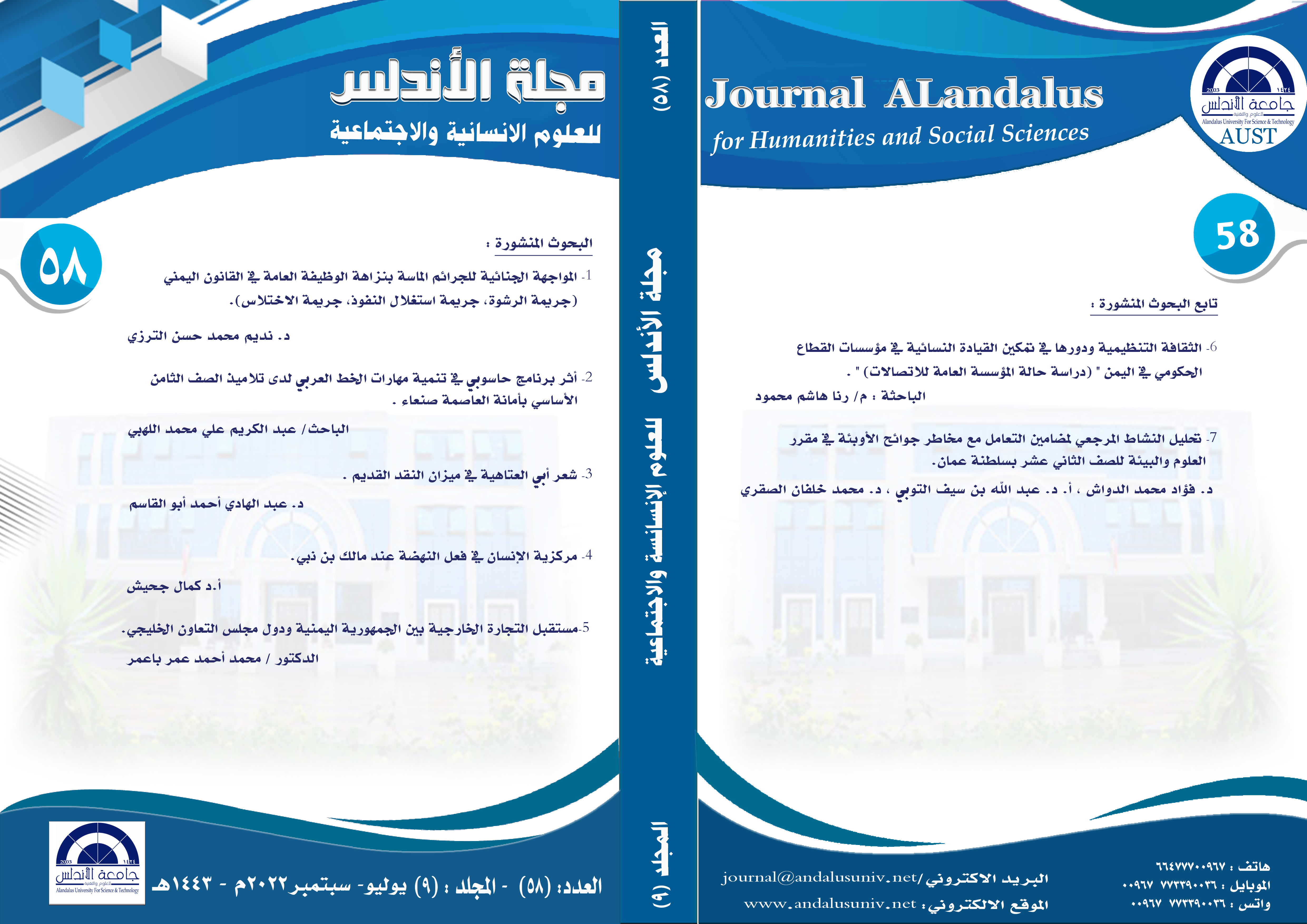Organizational Culture and its role in empowerment Women Leaders in public sector Case Study of the Public Telecommunication Corporation (PTC) إعداد الباحثة: م/ رنا هاشم محمود*
Main Article Content
Abstract
The study aims to know the role of organizational culture in empowering women's leadership in government sector in Yemen. the study used the descriptive analytical method, and a questionnaire was used that contained 42 questions distributed on the elements of organizational culture. Part of these questions were allocated, including paragraphs related to empowering women's leadership in particular, and knowing the level of empowerment in the PTC in general, and included 600 respondents in the community sample.The study reached the following results:The senior leadership should give importance to the role that organizational culture plays in getting rid of administrative & financial corruption& contributing to administrative development.The necessity of equal opportunities for employees (female and male) to reach higher administrative positions on the basis of capabilities and competence. Urging the provision of a positive work climate and the creation of an organizational culture that respects women and is far from inferior viewpoint and questioning the capabilities and skills of women in management. Work to clarify all the administrative systems and methods used in appointment, promotion, rights and duties, whose practice becomes an organizational culture acquired by individuals,the more clear and fair these systems are, the more they establish a strong organizational culture.Moving faster towards diagnosing organizational obstacles that limit the dissemination of the culture of empowerment. Keywords:organizational culture,empowerment,women's leadership.
Article Details
References
المراجع العربية:
إبن منظور، محمد بن مكرم ( 1994 ): لسان العرب، مج 3، ط3، دار الفكر للطباعة، بيروت.
أفندي، عطية، تمكين العاملين : مدخل للتطوير والتحسين المستمر، المنظمة العربية للتنمية الإدارية، القاهرة(2003).
الحمّادي، علي: 2006 تساعية صناعة القيادات، مركز التفكير الإبداعي، أبو ظبي، الامارات.
الساعد، رشاد محمد ( 2004 ): مدى الارتباط بين فلسفة الإدارة والسلوك القيادي وأثره على الإبداع التنظيمي، مجلة دراسات المستقبل –جامعة أسيوط-، العدد العاشر، ص(54- 31).
المنقاش، سارة عبد الله ( 2007 ): القيادة فوق الجماعة والقيادة مع الجماعة دراسة مقارنة بين قيادة الذكور والإناث في جامعة الملك سعود بالرياض، مجلة رسالة التربية وعلم النفس، عدد 28 ، ص 35-54.
المجلة الأردنية في إدارة الاعمال.العدد مج17, ع1.
حسن، ماهر محمد ( 2004 ): القيادة أساسيات ونظريات ومفاهيم، ط1، دار الكندي،إربد، الأردن.
عياصرة، والفاضل، محمد ( 2006 ) :الاتصال الإداري وأساليب القيادة الإدارية في المؤسسات التربوية، ط1، دار الحامد للنشر والتوزيع، عمان، الأردن.
فليه، فاروق وعبد المجيد، السيد ( 2005 ): السلوك التنظيمي في إدارة المؤسسات التعليمية، ط1، دار المسيرة للنشر والتوزيع والطباعة، عمان، الأردن.
مازن، عبد العزيز، التمكين الذاتي خطوة نحو التمكين المؤسساتي، الأردن، عمان2006.
مجلة جامعة الانبار للعلوم الاقتصادية والإدارية. مج12, ع28.
المراجع الأجنبية
D.E., Bowen and E., Lawler, Empowerment of Service Employee, Sloan Management Review, Summer,1995, pp. 73.
Marshall, J. Women Managers: Travelers in a Male World Chichster: John Wiley and Sons Inc. (1984).
William, Umiker, Empowerment The Lastet Strategy, Health Care Supervision, 1992, Vol.11, No.12, p.

